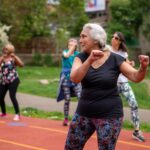Improving diet and increasing physical activity levels together may be more effective at preventing weight gain – particularly harmful fat inside the abdomen – than just changing one of these […]
NHS Active 10 walking tracker users more active after using the app
Users of the NHS Active 10 app, designed to encourage people to become more active, immediately increased their amount of brisk and non-brisk walking upon using the app, according to […]
Long-running EPIC-Norfolk study shows it’s never too late to make healthy changes
Today ITV Anglia reported on new results from the EPIC-Norfolk study that examined the impact of changes in diet and physical activity over more than a decade on the risk […]
PhD Studentships in Epidemiology or Public Health Research 2025/26
The MRC Epidemiology Unit is pleased to announce the availability of PhD student places to start in 2025/26. We investigate the causes and prevention of diabetes, obesity and related metabolic […]
Can improving cardiorespiratory fitness help prevent type 2 diabetes? Genetics may hold the answer
Higher cardiorespiratory fitness is associated with higher insulin sensitivity and lower risk of type 2 diabetes, but until now it hasn’t been clear if the relationship is causal, and the […]
Daily 11 minute brisk walk enough to reduce risk of early death
One in ten early deaths could be prevented if everyone managed at least half the recommended level of physical activity, say a team led by researchers at the MRC Epidemiology […]
Fitness levels can be predicted using wearable devices…and no treadmill required!
Cambridge researchers have developed a method for measuring overall fitness accurately on wearable devices – and more robustly than current consumer smartwatches and fitness monitors – without the wearer needing […]
Wearable device study in 88,000 people shows the heart health benefits of more intense physical activity
Increasing physical activity of any intensity is beneficial for health, but new research published today in the European Heart Journal shows that there is a greater reduction in cardiovascular disease […]
Reducing TV viewing to less than one hour a day could help prevent more than one in ten cases of coronary heart disease
Watching too much TV is associated with increased risk of coronary heart disease regardless of an individual’s genetic makeup, say a team of scientists at the Medical Research Council (MRC) […]
Largest ever study using wearable devices finds physical activity is beneficial for health, and more intense activity is better
Physical activity of any intensity is beneficial for health, but more intense activity has greater benefits, according to a new study published today in Nature Medicine. In the largest study […]

 MRC Epidemiology Unit
MRC Epidemiology Unit







